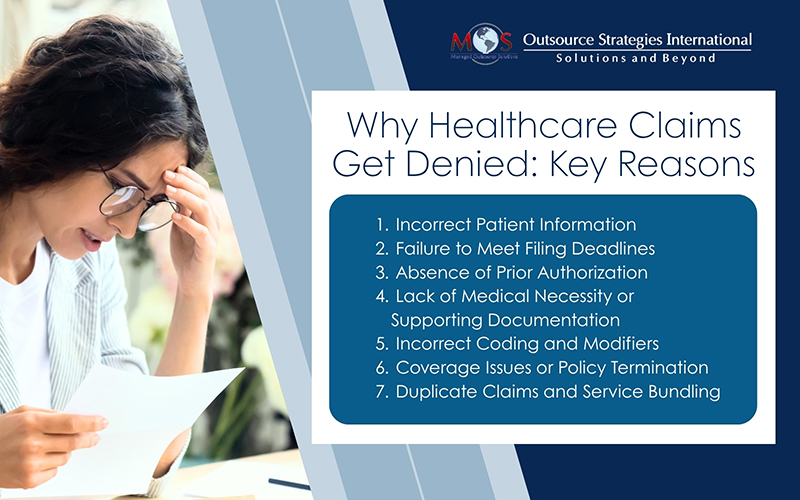When it comes to the world of healthcare revenue cycle management, insurance claim denials are a major pain point that can significantly disrupt cash flow. Not only do they delay reimbursements, but they also waste staff time and impact patient care, revenue streams, and operational efficiency. Most healthcare organizations lose 6 to 8 percent of their total revenue due to payment denials. Understanding what is denial in medical billing and why it happens is crucial. In this post, we explore the top common claim denial reasons, why claims are rejected, and provide actionable steps you can follow to prevent denials as well as best practices for timely filing of medical claims.
What Is Denial in Medical Billing?
In medical billing, a denial occurs when an insurer refuses to pay for a submitted claim, often due to issues like coverage exclusions, lack of medical necessity, or absence of prior authorization. However, this differs from a rejection, which typically stems from administrative errors such as missing data or incorrect formatting during submission. From a healthcare provider’s standpoint, early identification of denials and rejections is essential. Rejections can often be corrected and resubmitted quickly, whereas denials may require deeper review or appeal.
Get expert RCM support tailored to your practice.
Claim Rejection vs. Denial
Effectively managing claim denials involves understanding the differences between a rejection and a denial and categorizing them correctly. Rejections are typically due to minor issues, such as missing or incorrect information, and can usually be corrected quickly. Denials, on the other hand, involve more complex problems, such as non-covered services or incorrect coding, which may require a more thorough review and appeals process. By analyzing these denials and identifying patterns, healthcare organizations can address the root causes and minimize future issues. Once the denial is analyzed, categorizing it correctly is essential for addressing the issue effectively.
Effective Strategies to Reduce Claim Denials in Your Medical Practice
Top Reasons for Claim Denials and How to Prevent Them
Claim denials arise for diverse reasons, and understanding these common causes is crucial to preventing them in the future. Addressing these issues at an early stage can save healthcare providers time and money.
Here discussed are some of the most common reasons why healthcare providers face claim denials:
-
- Incorrect Patient Information: Accurate and thorough documentation is crucial for the approval of insurance claims. Inaccurate or missing details about the patient’s diagnosis, treatment, or procedure can lead to claim denials. All information provided in the claim should be accurate and complete.
- Ensure that the provider’s information, including name, address, and National Provider Identifier (NPI), is accurate and complete.
- Patient details should include name, date of birth, address, and insurance policy number.
- The codes, including procedure, diagnosis, and place of service, must accurately reflect the service or treatment provided. The procedure code must match the service delivered, the diagnosis code must be medically necessary and supported by medical records, and the place of service code must correspond to the location where the service was rendered.
- Provide supporting documentation, such as medical records, prescriptions, and referral forms.
- Incorrect Patient Information: Accurate and thorough documentation is crucial for the approval of insurance claims. Inaccurate or missing details about the patient’s diagnosis, treatment, or procedure can lead to claim denials. All information provided in the claim should be accurate and complete.
Make sure that you have a good patient information collection and verification system in your practice. Have electronic health records (EHR) software as part of the patient registration process and eliminate many errors at one time. Always cross-check the data entered to avoid denial.
- Failure to Meet Filing Deadlines: Another reason for claim denial is the failure to submit the claim within the deadline. All insurance companies have a set time for submitting claims, and even the shortest delay leads to denial in claim submission. In order to prevent this, maintain a clean, updated schedule for every payer’s claim submission deadline. Make sure to set up reminders in your practice management system or with an automated tool for timely submissions.
- Absence of Prior Authorization: Certain insurance plans require healthcare providers to obtain prior authorization for specific services, medications, or treatment procedures before coverage is approved. In case one fails to obtain such authorization, the claims are instantly rejected. Services that commonly require prior authorization include – MRI and CT imaging, certain prescription medications, referrals to specialists and elective surgical procedures. Keep your communication open with the insurers so that there aren’t any last-minute surprises.
- Lack of Medical Necessity or Supporting Documentation: Insurance companies may refuse to process a claim if they believe the service or treatment was not medically necessary or the provided documentation does not sufficiently justify it. For instance, a surgical procedure may be denied if it is deemed that physical therapy would be an adequate treatment. To address such denials, an appeal may require the submission of the following:
- Additional documentation like medical records, prescriptions, or referral forms.
- Detailed justifications for any tests or treatments administered.
- A “Letter of Medical Necessity” from the attending physician.
- More specific or updated coding for the service.
- A more comprehensive explanation of the patient’s visit or condition.
- Information relevant to the insurance policy’s criteria for coverage.
- Incorrect Coding and Modifiers: One of the top reasons for claim denials is incorrect coding, whether it comes from outdated codes or procedure codes that are used incorrectly. It can even be a misuse of modifiers, as modifiers refer to add-on information related to the procedure, among other things. Make sure that your billing staff is continually trained and updated on the latest coding guidelines. Make regular updates to medical coding practices based on the latest standards. It is important to double-check the codes for accuracy before submitting the claims.
- Coverage Issues or Policy Termination: In certain cases, claims may get denied if the patient’s insurance policy doesn’t cover the service or the healthcare provider is out of network. So, confirm the patient’s coverage for specific services, check the eligibility status and coverage at every visit, and verify that the healthcare provider is within the insurance network. It is important to perform pre-authorization checks to ensure the service is covered under the plan. Make use of real-time verification tools to verify the current status of the patient’s coverage.
- Duplicate Claims and Service Bundling: Another common reason for denials is when the same claim is submitted multiple times. This normally occurs when you start following up on pending claims and automatically resubmit instead of updating the status of the claim submitted. Service bundling happens when multiple services are grouped together under one claim, which can lead to errors or underpayments if not handled correctly. To prevent this, follow these best practices:
- Follow up in an organized manner on all claims submitted and track them.
- Check if a claim has already been submitted before submitting a new one.
- Verify that you bundle services correctly according to the payer’s guidelines.
- Document any modifications to services clearly to avoid duplicate submissions.
- Regularly audit claims to identify potential duplicates or incorrect bundling.

From a healthcare provider’s vantage point, ensuring strong administrative workflows is just as essential as clinical excellence. By addressing common claim denial reasons, understanding what denial in medical billing is, and identifying reasons why claims get rejected, practices can elevate front-end data collection, coding accuracy, and authorization compliance. Implementing proactive workflows – such as how to prevent claim denials due to missing patient information and best practices for timely filing of medical claims – lays the foundation for higher first-pass claim acceptance. When denials happen, having a structured appeals and learning process ensures quick recovery and continuous improvement. This results in an optimized revenue cycle, reduced administrative overhead, and better experiences for both the provider and patient.
Struggling with denied claims or delayed payments?




